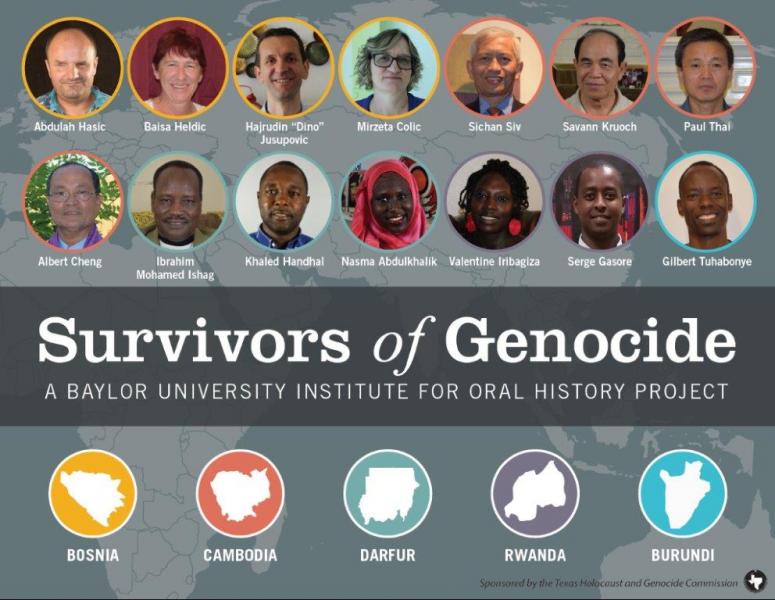- About Archives
- About SAA
- Careers
- Education
- Publications
- Advocacy
- Membership
The Baylor University Institute for Oral History (BUIOH) is proud to announce the launch of its newest project website, "Survivors of Genocide." From May 2015 through October 2016, the Institute conducted fourteen oral histories with survivors of the genocides in Cambodia, Rwanda/Burundi, Bosnia, and Darfur. This work was contracted through a grant from the Texas Holocaust and Genocide Commission in order for survivors who now live in Texas to tell their stories of escaping the horrors of their homelands and finding a new life in the United States.
The investigative team included principal investigator Dr. Stephen Sloan (BUIOH director), researcher/videographer Nathan Roberts (BUIOH graduate assistant), and Dr. Melissa Sloan, a licensed psychologist. The team travelled throughout Texas to conduct the interviews on-site, either in the narrators' homes or a local institution. Narrators were counselled not only on the technical and legal aspects of the interview process, but also the potential emotional trauma of reliving these harrowing stories. The psychologist was present throughout the entirety of the interview to determine if any immediate care was required, then provided a debriefing session afterwards to assess the narrators' condition, as well as a follow-up call several days after the interview.
Project interviews were deposited into the BUIOH digital archives, then entered into the Institute's transcript processing workflow. Both interviewers and interviewees were allowed the opportunity to review their transcripts prior to their publication online and/or the creation of bound memoirs of their testimony. These memoirs were provided to the interviewees, to a library local to the interviewees' place of residence, and to the Texas Holocaust and Genocide Commission.
All produced materials relating to the Survivors of Genocide project are available online through the project website and BUIOH’s content management system, ContentDM. When browsing the genocide pages, for each interviewee users can view a short "trailer" video of their testimony. Also included are links to their database entries and the OHMS portal where users can easily explore the full interview. OHMS stands for Oral History Metadata Synchronizer, a relatively new piece software developed by the University of Kentucky's Louie B. Nunn Center for Oral History. OHMS allows the user to simultaneously engage audio/video with a transcript or index. When interacting with an OHMS record, one can simply click on a topic or transcript timestamp to advance to that point in the narrative. The built-in search engine provides even greater discoverability while engaged with the video. OHMS records for this project currently exhibit what is termed "Level 2 Indexing." Index points will often feature descriptors or hyperlinks to relevant materials based on the topic being discussed.
The project website is accessible at http://www.baylor.edu/oralhistory/survivors. All summary and trailer videos, as well as a majority of the full interview videos, feature closed captioning for the hearing impaired.
